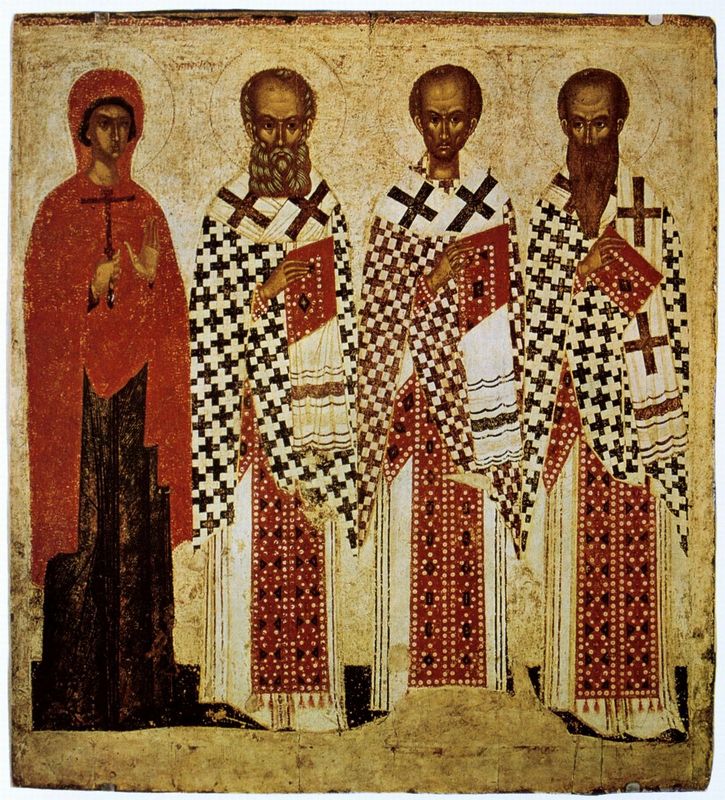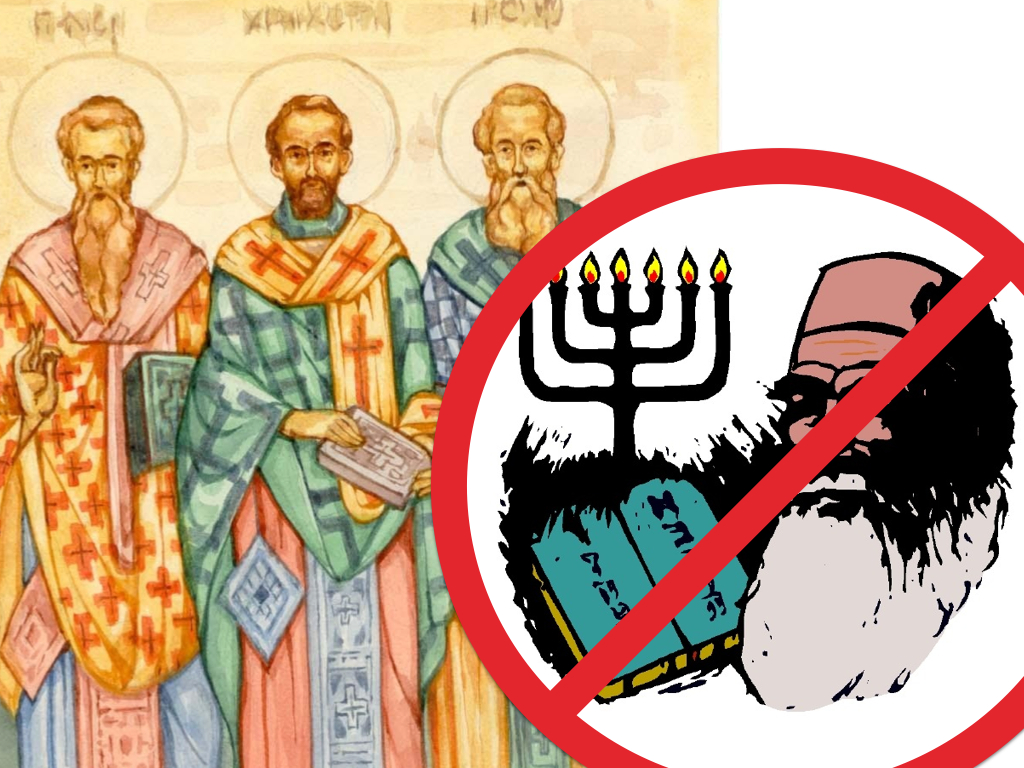In this video, Nathan shares insights about the timing of second exodus, who will be raptured (that is, resurrected at the last trumpet to meet Yeshua in the air), what happens to the saints after the first resurrection or rapture, the timing of the second coming, who will be the bride of Yeshua, and how this all relates to the defeat of Antichrist and Babylon the Great and marriage of the Yeshua. Buckle your seat belts and hang on tightly. This is a fast moving aerial view of many end time Bible prophecies!
Category Archives: Christian Church
How to View Sunday Christians From the Father’s Heart
For those Christians returning to the Hebrew, Torah roots of their faith, how is one now to view the mainstream church and the Sunday Christians they have left behind? Are they saved or unsaved, friend or foe or what? More importantly, what is the heart our Father in heaven’s view of mainstream Christians? As always, the Bible gives us the answer as this video reveals.
Why So Few Miracles in Today’s Church?
Leviticus 21 Emor–”In Vain They Worship Me”—Praise & Worship in the Church
In this video, we examine the Christian church’s typical praise and worship themes and then juxta pose them with the book of Psalms and how the Bible defines praise and worship. A major disconnect is exposed! Learn what the true praise and worship is that is pleasing to our Abba Father in heaven—YHVH Elohim.
This is a gospel-oriented Torah study guide. Our goal is to connect the good news of Yeshua the Messiah (the gospel message) to its Hebraic, pro-Torah roots or foundations. The information given here is more than head knowledge. Understanding and wisdom (the right application of knowledge that is based on truth) is taught thus making biblical truth practical, relevant and applicable to your daily life. The truths of the Bible not only have the power to transform your life here and now for the better, but eventually to take you past the veil of death and into eternity.
This Torah study is subdivided in sections by topic in a magazine format thus making it easy to watch at several sittings. May you be blessed as you watch this video.
For a free, printable adult and teen Torah study guide on this Torah portion (parashah), please go to http://www.hoshanarabbah.org/parshiot.html
The Heresies of Marcion the Heretic Persist in Today’s Mainstream Church
For the written study notes with references to quotations mentioned in this video, go to https://hoshanarabbah.org/blog/2024/05/04/the-leaven-of-the-early-church-fathers-exposed-from-biblical-truth-to-church-tradition/.
Anti-Semitic/Anti-Zionists Christians Liars Exposed
The Leaven of the Early Church Fathers Exposed—From Biblical Truth to Church Tradition

Were the Pharisees the Only Purveyors of Spiritual Leaven?
One of the most well-known biblical metaphors is leaven—the chemical agent that makes bread dough to rise. It is a descriptive biblical symbol of sin in one’s life that, like yeast that permeates dough, can permeate one’s life spiritually. During the biblical Feast of Unleavened Bread, YHVH instructs his people to remove all leavening from their homes for seven days—a vivid illustration of the divine mandate to remove sin from the house of our life. Paul warns the saints against the negative impact of spiritual leaven.

Your glorying is not good. Know ye not that a little leaven leaveneth the whole lump? Purge out therefore the old leaven, that ye may be a new lump, as ye are unleavened. For even Messiah our passover is sacrificed for us: therefore let us keep the feast, not with old leaven, neither with the leaven of malice and wickedness; but with the unleavened bread of sincerity and truth. (1 Cor 5:6–8)
But there is another type of spiritual leaven that is equally dangerous and that Yeshua warned his disciples about: the leaven of false religious doctrine.
How is it that ye do not understand that I spake it not to you concerning bread, that ye should beware of the leaven of the Pharisees and of the Sadducees? Then understood they how that he bade them not beware of the leaven of bread, but of the doctrine of the Pharisees and of the Sadducees. (Matt 16:11–12)
Then Yeshua said unto them, Take heed and beware of the leaven of the Pharisees and of the Sadducees. (Matt 16:6)
And [Yeshua] charged them, saying, Take heed, beware of the leaven of the Pharisees, and of the leaven of Herod. (Mark 8:15)
In the mean time, when there were gathered together an innumerable multitude of people, insomuch that they trode one upon another, he began to say unto his disciples first of all, Beware ye of the leaven of the Pharisees, which is hypocrisy. (Luke 12:10)
The leaven to which Yeshua here was the false doctrines that had crept into the Jewish religious system that was contrary to the written Word of Elohim. These were the traditions of men that had made the Word of Elohim of non-effect.
Then the Pharisees and scribes asked him, Why walk not thy disciples according to the tradition of the elders, but eat bread with unwashen hands? He answered and said unto them, Well hath Isaiah prophesied of you hypocrites, as it is written, This people honoureth me with their lips, but their heart is far from me. Howbeit in vain do they worship me, teaching for doctrines the commandments of men. For laying aside the commandment of Elohim, ye hold the tradition of men, as the washing of pots and cups: and many other such like things ye do. And he said unto them, Full well ye reject the commandment of Elohim, that ye may keep your own tradition.…Making the word of Elohim of none effect through your tradition, which ye have delivered: and many such like things do ye. (Mark 7:5–9, 13)
But do we really think that the Pharisees of Yeshua’s day were the only religious leaders to be guilty of the sin of promoting spiritual leaven? Of nullifying the Word of Elohim by their manmade, non-biblical and sometimes even pagan traditions? Hardly. Humans are humans then and now regardless of the epoch, the culture or country. There is nothing new under the sun, as Solomon declared.
This brings us to the so-called early church fathers of second century of the common era, who laid much of the theological foundation for the modern Christian church by interpreting biblical Truth in a particular and often slanted way, which we will document and discuss below.
The Rails of Biblical Truth
The Bible has given us certain spiritual guidelines, like rails on train track, to keep us pointed in the right direction and on the track toward redemption or salvation, sanctification and eventually the eternal reward of glorification and adoption into the family of Elohim. They help to keep our faith strong during our spiritual journey and our focus straight ahead and pointed toward the end goal. Any deviation therefrom threatens to head us in a completely different direction with a different end point.

Indeed, Christianity tends to promote keeping one’s eyes on Jesus, who, in a sense, is the end goal. But in practical terms, what does that actually mean? Do we keep our eyes only on a personality? Or is Christianity more than a personality cult? Too often Christianity has tended to be the religion about Jesus, not the religion of Yeshua. Shouldn’t we be trying emulate how he lived by obeying what he taught? It is one thing to keep our focus on Yeshua—a good thing, but at another and higher level, it’s another thing actually to obey what he taught—his commandments, which tell us how to love him and our fellow man, and how to live a life of holiness and being set-apart from this world, or, in other words, to be in the world but not of the world.
At the center of the religion of Yeshua is holiness, which is about separation. Separation from what? From that which is polluted, impure, profane and defiled. It is about becoming holy as YHVH is holy. What pollution? The pollution of the world, the flesh and the devil. There are several key element or rails of the track of holiness that will lead us to becoming separate from the world and closer to our Father in heaven. What are they? They have to do with holy food and holy times. The foods YHVH’s people eat and the special times that YHVH has called “holy” or “set-aprt” are when he commands his saints to come out of the world and to focus on him. This has a lot to do with true biblical holiness. It is about transcendency, that is, transcending above the profane or worldly or coming out of the world to commune with Elohim and his people who love him. A holy diet and observing holy times are essential to keep one’s spiritual train on the track that leads to holiness. For example, if you can neither eat the world’s food nor observe their holidays and celebrations, that largely puts you on the outs with the world, doesn’t it? Eating special food and observing special times puts you on a different track from the world. Thus, the biblical dietary laws along with YHVH’s Sabbaths (the weekly Sabbath and biblical feasts) are separating elements, and that is what holiness is all about—separating from the world, being holy are set-apart, and being called out of the world. After all, is not the word ecclesia meaning “the called out ones,” which is the Greek word behind the word church in the New Testament, is all about?
In many ways, the early church fathers of the second century and onward, in a markedly and determinant manner, veered off the rails of the Hebraic faith of Yeshua and his apostles and commenced to move in an unbiblical direction, which they then passed on down to the Christian church to this day. If we care about biblical Truth, we must face the fact that the early church fathers, like their ancient Jewish predecessors, have passed on down many lies, which we have inherited many lies (Jer 16:19). In real and substantial ways, and in their own words, they have, to one degree or another, rejected the Truth of YHVH’s Torah and considered it a strange thing as did the ancient Israelites (Hos 4:6; 8:12). They too have even rebelled against it (Hos 8:1)! The call is now going out to come back to the good and ancient paths of Torah (Jer 6:19), to return to the law of Moses and to the Hebraic fathers of our faith before the great and terrible day of YHVH’s wrath comes on the earth quickly and unexpectedly (Mal 4:4–6; Hos 6:1).
So the rails of our biblical faith that lead to the kingdom of Elohim included teaching and then living out YHVH’s Torah-laws along with his standards of holiness including the seventh day Sabbath, the biblical feasts and the biblical dietary laws. The Bible defines these not only as obedience issues, but holiness issues that help to keep YHVH’s people separate from the world around them, and are also essential helping them to maintain a right and personal relationship with YHVH himself. It’s about love. Yeshua said that, if you love me, then keep my commandments (John 14:15, 21).
The Bible predicted that YHVH’s people would turn from his Truth again and again. It is called apostasy. It is an endless cycle that has repeated itself many times over the long history of YHVH’s people. And, sadly, it repeated itself in some major ways with the early church fathers. Don’t believe me? Shortly below, we will document this in their own words as show utter disdain for the Hebraic roots of their faith, the Jewish people and many of YHVH’s instructions in righteousness—his Torah-law, of which the biblical feasts, the seventh day Sabbath and YHVH’s dietary laws are key exhibit one.
Curiously, and the facts of history bear this out, the seventh day Sabbath, the biblical feasts and dietary laws along with an opposition to YHVH’s Torah also known as the Mosaic law were among the first aspects of biblical Truth that YHVH’s people including the early church fathers abandoned. Apostasy began here. And, down the line, as YHVH’s people wake up to the fact that, in many respects, they have left the rails of their Hebraic faith, it is Sabbath, feasts and biblical dietary laws to which they usually first return. To move forward spiritual toward one’s ultimate destiny, one must first backtrack to where the errant side rails branched off the main rail line in a different direction, and this time take the right track. The way out is the way back in, and the way back is the way forward.
Now let us examine the written historical record of the sad apostasy or abandonment of much biblical Truth by the early church father from their own writings.
Discovering How the Early Church Fathers Jumped Off the Track of Holiness

In what follows, I document from the actual writings of the early church fathers of the second century onward many outright lies, false teachings, deceptions, twisting of the Scriptures, calumnies, virulent racist anti-semitism and blasphemies that are contrary to the Truth of the Bible. When you read their actual quotes, one has to wonder if some of them had ever read the Bible, or if so, how well they knew the Scriptures. Yet sadly many fundamental doctrines of present day normative Christianity are based on the writings of these men. As the Bible says, our fathers have inherited many lies. It is time to learn the truth, and when you do, you will be set free from the doctrines and traditions of men that make of non-effect the Word of Elohim!
At the same time and in all fairness to the objective truth, the early church fathers have written much that is good. They are valiant and often brilliant in their combatting the various pagan Greek philosophies and Christian heresies of their day. Admittedly, one can learn much from them, but why not go directly to the source of wisdom and Truth—the Bible instead—and feed on the manna from heaven rather than on food that has gone through the filters of men’s spiritual digestive systems and then regurgitated out as second hand pap? This assessment of what they have to say may sound harsh and even crass, but when actually takes the time to read much of what they have to say that is contrary to the precious Truth of YHVH Elohim as revealed in the Scriptures, this assessment is mildly stated.
Sadly, and in many respects, there is manifested among many if not most of the early church fathers a lack of understanding of the more distinct and foundational Hebraic concepts of the Scriptures such as the relevance of YHVH’s Torah-law to the life of the saint. In many of their writings, they seem to rely more on human reasoning and philosophical explanations than on the Written Word of Elohim to make their points. It is true that some of the fathers seemed to have had a more complete knowledge of the Scriptures than others. This may be due to the fact that they had better access to the actual (scarce) scrolls and books containing the Scriptures than others of their contemporaries. Whatever the case, nearly all of them were non-Jewish, and thus were not raised in a Hebraic culture as were the writers of the Scriptures; therefore, their understanding is deficient in this area. Rather, they came from a Hellenistic cultural background and were influenced, to one degree or another, by the Greek philosophers, whose ideas permeated and informed the culture and ethos of the Roman empire. This is evident in the writings of the early church fathers where there seems to be a lack of understanding of the Hebraic (Oriental) mindset or perspective, and an acquiescence, instead, to that of the Greek perspective with its philosophical backdrop and approach (i.e., humanistic reasoning) as I will document below.
With these things in mind, let us now bring to the light of day some of the more anti-Torah and virulent anti-Jewish theologies of the early church fathers, which have been scattered prolifically throughout the thousands of pages of their writings. The theological foundation they laid in these writing eventually gave rise to philosophical and theological Christianity, which insinuated itself into and was codified into mainstream Christian church dogma and became part of a religious system (or churchianity) that became known as Roman Catholicism and was then passed on down the various iterations of mainstream Christianity as we know it today.
All of the following quotes, unless otherwise noted, are from The Ante-Nicene Church Fathers—The Writings of the Fathers Down to A.D. 325, edited by Alexander Roberts and James Donaldson; Hendrickson Publishers, Peabody, Mass.: 1995.
The Writings of the Earliest Church Fathers That Are Opposed to Bible Truth

The Seventh Day Sabbath and the Biblical Feasts Annulled
Continue reading
